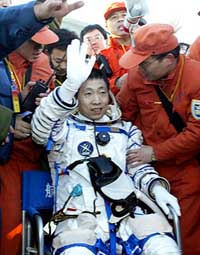NASA leaders will get peek at China's secretive space program
U.S. space officials will get a peek behind the closely guarded doors of China's space program next week during a visit that many experts believe is more about diplomacy than cooperation in technology.

President George W. Bush asked NASA Administrator Michael Griffin to go to China last spring, following a visit from Chinese President Hu Jintao. During the four-day trip which starts Sunday, a delegation led by Griffin will meet with the head of the Chinese Aerospace Bureau and visit the Chinese Academy of Sciences in Beijing before traveling to China's launch facility in the Gobi Desert.
"This is a get-acquainted session and it's nothing more," Griffin said earlier this week.
The United States has never had significant space discussions with China, even though both countries, along with Russia, are the only nations that can launch people into orbit, reports AP.
The chief obstacle to more space cooperation has been the military influence over China's space program. The military's presence proved dicey for some U.S. firms that tried to work with the Chinese in the late 1990s and early 2000s on launching satellites. They were accused by the U.S. government of giving the Chinese satellite and rocket technology that could be used for intercontinental missiles.
NASA says there will not likely be space cooperation agreements with China like the one the U.S. space agency produced from Griffin's visit to India in May. The U.S. space agency has multiple agreements with other spacefaring nations, most notably Russia, Europe, Canada and Japan in building and operating the international space station.
The only areas where the United States and China might work together are in exchanging data on earth science, managing the radio frequency spectrum, and controlling orbital debris, one NASA official suggested.
Some experts, though, doubt the U.S. would gain much from cooperating with China in space, especially since the U.S. program is so much more advanced.
Subscribe to Pravda.Ru Telegram channel, Facebook, RSS!




